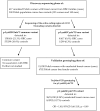Analysis of GEN1 as a Breast Cancer Susceptibility Gene in Polish Women
- PMID: 40649769
- PMCID: PMC12250413
- DOI: 10.3390/ijms26135991
Analysis of GEN1 as a Breast Cancer Susceptibility Gene in Polish Women
Abstract
GEN1 is implicated in DNA damage repair, as are several other breast cancer susceptibility genes, and is included in several comprehensive next-generation sequencing (NGS) testing panels. To investigate the possible association of GEN1 variants with breast cancer risk, we sequenced this gene in 617 Polish women with hereditary breast cancer (HBC) and 300 Polish cancer-free controls. No protein-truncating variants were detected in the conserved part of GEN1 (first 480 codons). Two frameshift variants were detected in the last exon of GEN1: c.2515_2519delAAGTT (p.Lys839Glufs*2) and c.1929_1932delAAAG (p.Lys645Cysfs*29). The p.Lys839Glufs*2 variant was detected in 21.1% of 617 HBC cases and 18.4% of 300 controls (p = 0.38). The p.Lys645Cysfs*29 variant was rare, seen in 0.6% of 617 HBC cases and 0.3% of 300 controls. The variant was then detected in 38 (0.24%) of 15,930 unselected breast cancer cases and 8 (0.17%) of 4702 cancer-free female controls from Poland (OR = 1.40, p = 0.49). Clinical characteristics of breast tumors in the 38 carriers of p.Lys645Cysfs*29 and 15,892 non-carriers were similar. Survival was similar among variant carriers and non-carriers (the age-adjusted HR = 0.87, p = 0.76). The wild-type GEN1 allele was retained in all five breast cancers of carriers of p.Lys645Cysfs*29. No cancer type was more frequent in the relatives of 35 p.Lys645Cysfs*29 variant carriers compared to the relatives of 14,592 non-carriers. We conclude that GEN1 is unlikely to be a high or moderate-risk breast cancer susceptibility gene. Our study has clinical implications for genetic counseling and suggests that GEN1 changes should be reclassified as variants of uncertain significance (VUS) when they are detected in clinical testing panels.
Keywords: GEN1; cancer; germline mutations; susceptibility.
Conflict of interest statement
The authors declare no conflicts of interest.
Figures


References
-
- Nelson H.D., Pappas M., Zakher B., Mitchell J.P., Okinaka-Hu L., Fu R. Risk assessment, genetic counseling, and genetic testing for BRCA-related cancer in women: A systematic review to update the U.S. Preventive Services Task Force recommendation. Ann. Intern. Med. 2014;160:255–266. doi: 10.7326/M13-1684. - DOI - PubMed
MeSH terms
Supplementary concepts
Grants and funding
LinkOut - more resources
Full Text Sources
Medical

